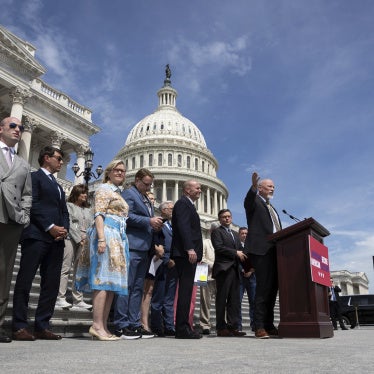New Jersey’s governor tomorrow is scheduled to sign into law a temporary moratorium on the death penalty in the state. Governor Richard Codey and state legislators should now move forward to permanently abolish this arbitrary and inherently cruel punishment.
This moratorium will remain in place at least until a commission appointed by the governor reports on the cost and fairness of the state’s death penalty. Currently, there are 10 people on death row in New Jersey.
Over the last month, the New Jersey legislature overwhelming supported the moratorium in votes of 55-21 with two abstentions in the state Assembly, and 30-6 in the state Senate. Growing awareness of arbitrariness in the imposition of death sentences and the fallibility of criminal justice systems in imposing this irreversible penalty were key factors in the legislature’s decision.
“Each step away from the death penalty is progress,” said Jennifer Daskal, U.S. advocacy director at Human Rights Watch. “We are optimistic that the commission will conclude that the death penalty should have no place in New Jersey law.”
In the United States, more than 120 people have been released from death row since 1976 due to evidence of their innocence. Just last year, six individuals were exonerated. Although none of the exonerated had been sentenced to death in New Jersey, the growing national pace of exonerations has deeply troubled state legislators and the public.
The racial, geographic and economic disparities that permeate the death penalty were additional factors that influenced the New Jersey legislators. In New Jersey, African-Americans charged with killing white victims are much more likely to receive the death penalty than African-Americans charged with killing African-American victims. Prosecutors in certain counties have been far more likely to seek the death penalty than their counterparts elsewhere – meaning that the location of the crime influences the likelihood of receiving the death penalty. In fact, 50 percent of the 16 death penalty charges brought in 2005 stemmed from just two of New Jersey’s 21 counties, Cumberland and Morris.
Moreover, defendants who are poor are generally represented by appointed counsel, who are often underpaid, overworked and unable or unwilling to mount an effective defense. As a result, their clients are much more likely to be sentenced to death than defendants who can afford competent counsel.
The New Jersey legislation mandates that the governor appoint a commission to conduct a comprehensive review of these and other factors affecting the application of the death penalty. The commissioners will study the economic costs of the death penalty, its effectiveness, and key factors such as racial bias and geographic distribution that affect the imposition of the death penalty. The commission must be appointed within 45 days of the signing of the bill, and must complete its report by November 2006, two months before the temporary moratorium is set to end on January 15, 2007.
Thirty-eight states, the federal government and the U.S. military still retain the death penalty. In 2004, state courts in two of those states – New York and Kansas – declared the death penalty unconstitutional. A governor-imposed moratorium on all executions has been in place in Illinois since 2000. And the California legislature is currently considering a moratorium on the application of the death penalty as well.
Human Rights Watch opposes capital punishment in all circumstances because of its cruel and inhumane nature. The cornerstone of human rights is respect for the inherent dignity of all human beings and the inviolability of the human person. These principles cannot be reconciled with the death penalty, a form of punishment that is unique in its barbarity and finality. The intrinsic fallibility of all criminal justice systems assures that even when full due process of law is respected, innocent persons may be executed.







